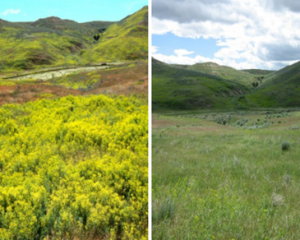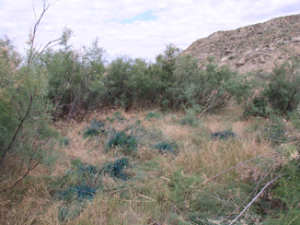
The Wyoming Weed and Pest Council (WWPC) is know for its great members who continuously work hard to manage invasive species. Since 1973, supervisors and staff with districts across the state have provided years of service to keep Wyoming wild and beautiful. That’s especially true of Rod Litzel, who recently retired as district supervisor with the Johnson County Weed and Pest after working there for 34 years.

Litzel grew up in Buffalo, WY and studied just two hours away at Casper College. To help pay for college, he successfully participated on the livestock judging team. Because of this, he was recruited to Texas A&M University for their team. During his senior year of college, he interviewed for the district supervisor position at Johnson County and he was offered the job.
“After spending two years in Texas, you start appreciating Buffalo and Wyoming,” Litzel states. “In particular, trying to get out of the heat and back into four seasons, hunting, and doing all the stuff I enjoyed. It was a great experience, but I was ready to come home.”
In the summer of 1988, Litzel began his career as district supervisor. Throughout his career, two programs stood out – the leafy spurge and saltcedar. The leafy spurge program was already in place when he arrived, but over time realized he needed to make some changes.
“In terms of changing our philosophy where we weren’t just going to throw money at something to spray something, we wanted to have some intent and purpose, a plan with landowners,” Litzel says.
In 2000, instead of using heavy amounts of herbicides every two to three years on little infestations of leafy spurge, Litzel wanted to attack the core of the problem. The program turned to using a smaller amount of herbicides on the invasive weed and chose to apply it every year. What used to be a sea of yellow is now healthy, native grass.

He turned the program around by listening to the landowners, and in turn, the landowners committed to his ideas.
“It took me 8 or 10 years to realize that the landowners were what I was here for,” Litzel says. “Not for my own ambition, but to help them. It became a thing that I realized I really enjoyed was being able to help them.”
The other program that he’s proud of is the saltcedar initiative. In his first years at Johnson County Weed and Pest, he mentioned a local landowner who would come in quite often and prod him to do things.
“She had been hounding me for probably five years about the saltcedar down on her place on Powder River,” Litzel recalls. “So, in 2007, we started on her place with not much of a plan, but just started trying different things.”
Litzel and the landowner’s husband took two chainsaws to the saltcedar, where Litzel would cut the invasive species until the chain would slip off. While the first chainsaw was being put back together and sharpened, Litzel kept going with the second chainsaw.
Fast forward to today and it’s obvious the program has been successful as there is little to no saltcedar along the Powder River. In 2017, the District board elected to remove saltcedar from the special management program because of the reductions made to the invasive weed.

“The biggest reward out of this whole thing was having those good board members,” Litzel adds. “And then, pure and simple, good landowners to work with. It takes both in order to make it go.”
When asked what he wanted others to know about fighting invasive species, Litzel said it’s about commitment, “I think too often, there’s the desire to have that silver bullet,” Litzel stated. “You’ve got to have a plan in the works, and you’ve got to stay committed, or it’s not going to work.”
Not only did Litzel work in the field for Johnson County, he helped WWPC in other ways as well. Litzel assisted in the state allocations committee, reviewed federal legislation, and developed best practices for management.
“He had a vast knowledge of how things work, how things should work, and experiences that I drew on very heavily when I took the job,” said Slade Franklin, former Weed and Pest Coordinator with the Wyoming Department of Agriculture. “It’s not only the professional relationship that I appreciate, but he is a good friend. I think everyone could learn from Rod.”
Now that Litzel is retired, he says he is looking forward to working part-time in the field with his son and going on long weekend trips with his wife. He’s grateful for his time with Johnson County Weed and Pest and WWPC and looks back on it fondly.
“I am honored to have been part of an organization with dedication, passion, professionalism, camaraderie and friendship at the heart of it,” Litzel says. “I am going to miss that and the good people that are a part of it.










